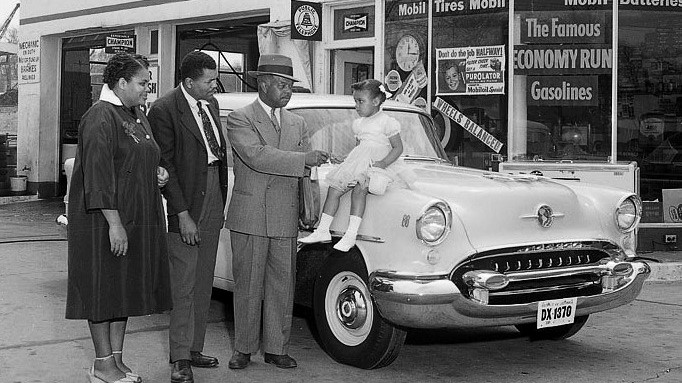Authors:
Historic Era: Era 9: Postwar United States (1945 to early 1970s)
Historic Theme:
Subject:
Summer 2021 | Volume 65, Issue 5


Authors:
Historic Era: Era 9: Postwar United States (1945 to early 1970s)
Historic Theme:
Subject:
Summer 2021 | Volume 65, Issue 5
Editor's Note: Candacy Taylor is an award-winning author, photographer, and cultural documentarian. The following is an excerpt from her most recent book, titled the Overground Railroad: The Green Book and the Roots of Black Travel in America, published by Abrams Books.

“Don't you dare say a word.” Ron was sitting in the back seat as his father pulled the car to a stop at the side of the road. His father had told him to be quiet before, but this was the first time Ron felt the words reverberate to the pit of his stomach. Moments later, the sheriff stood over the well-appointed 1953 Chevy sedan complete with all the modern features you read about in the magazines.
“Where did you get this vehicle? What are you doing here? And who are these people with you?” the sheriff asked. Ron’s father answered, “It’s my employer’s car.” He pointed to his wife, sitting upright and expressionless in the passenger seat. He pretended that she wasn’t his wife and said, “This is my employer’s maid, and that is her son in the back. I’m taking them home.”
The sheriff took a long, hard look at Ron’s mother and then angled his eyes to the back seat. A young Ronald sat tight-lipped, too afraid to turn his head or even take a breath. “Where’s your hat?” the sheriff barked at Ron’s dad.
“Hanging up right behind me in the back seat, officer.” The sheriff waved. “All right. Move on.”
As they drove north across the Tennessee border, a sad, eerie silence hung in the air. Ron watched Daddy and Mama exchange knowing glances and then turned his head to look at the black, unassuming cap that had been hanging next to him in the back seat ever since he could remember. It wasn’t until that moment that he realized why he had never seen his father wearing it. Mama wasn’t a maid, and Daddy wasn’t a driver. He had a good job with the railroad, and this was their family car.
Until that day, Ron never paid attention to that cap, but now he realized that it wasn’t just any hat. It was a chauffeur’s hat. A ruse, a prop — a lifesaver.
During the Jim Crow era, the chauffeur’s hat was the perfect cover for every middle-class black man pulled over and harassed by the police. If Ron’s father had told the sheriff the truth — that he was driving his own car and that they were a family on vacation — the sheriff wouldn’t have believed him. He would have assumed the car was stolen.